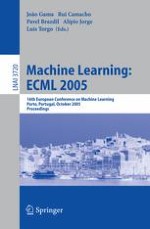2005 | OriginalPaper | Chapter
Statistical Relational Learning: An Inductive Logic Programming Perspective
Author : Luc De Raedt
Published in: Machine Learning: ECML 2005
Publisher: Springer Berlin Heidelberg
Activate our intelligent search to find suitable subject content or patents.
Select sections of text to find matching patents with Artificial Intelligence. powered by
Select sections of text to find additional relevant content using AI-assisted search. powered by
In the past few years there has been a lot of work lying at the intersection of probability theory, logic programming and machine learning [14,18,13,9,6,1,11]. This work is known under the names of statistical relational learning [7,5], probabilistic logic learning [4], or probabilistic inductive logic programming. Whereas most of the existing works have started from a probabilistic learning perspective and extended probabilistic formalisms with relational aspects, I shall take a di.erent perspective, in which I shall start from inductive logic programming and study how inductive logic programming formalisms, settings and techniques can be extended to deal with probabilistic issues. This tradition has already contributed a rich variety of valuable formalisms and techniques, including probabilistic Horn abduction by David Poole, PRISMs by Sato, stochastic logic programs by Muggleton [13] and Cussens [2], Bayesian logic programs [10,8] by Kersting and De Raedt, and Logical Hidden Markov Models [11].
The main contribution of this talk is the introduction of three probabilistic inductive logic programming settings which are derived from the learning from entailment, from interpretations and from proofs settings of the field of inductive logic programming [3]. Each of these settings contributes di.erent notions of probabilistic logic representations, examples and probability distributions. The first setting, probabilistic learning from entailment, is incorporated in the wellknown PRISM system [19] and Cussens’s Failure Adjusted Maximisation approach to parameter estimation in stochastic logic programs [2]. A novel system that was recently developed and that fits this paradigm is the nFOIL system [12]. It combines key principles of the well-known inductive logic programming system FOIL [15] with the naïve Bayes’ appraoch. In probabilistic learning from entailment, examples are ground facts that should be probabilistically entailed by the target logic program. The second setting, probabilistic learning from interpretations, is incorporated in Bayesian logic programs [10,8], which integrate Bayesian networks with logic programs. This setting is also adopted by [6]. Examples in this setting are Herbrand interpretations that should be a probabilistic model for the target theory. The third setting, learning from proofs [17], is novel. It is motivated by the learning of stochastic context free grammars from tree banks. In this setting, examples are proof trees that should be probabilistically provable from the unknown stochastic logic programs. The sketched settings (and their instances presented) are by no means the only possible settings for probabilistic inductive logic programming, but still – I hope – provide useful insights into the state-of-the-art of this exciting field.
For a full survey of statistical relational learning or probabilistic inductive logic programming, the author would like to refer to [4], and for more details on the probabilistic inductive logic programming settings to [16], where a longer and earlier version of this contribution can be found.
